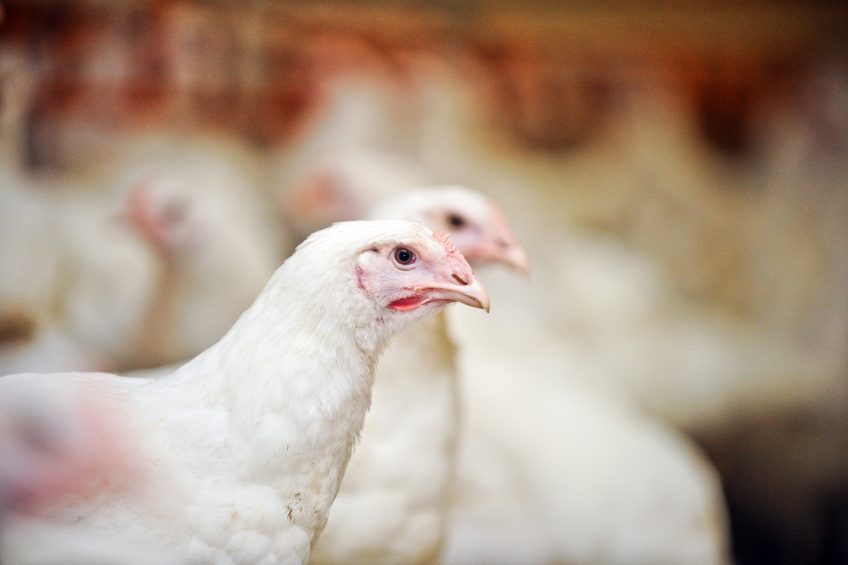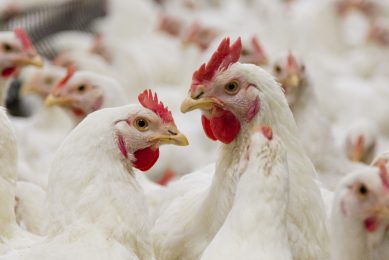US poultry vet shares key factors to control NE

Nutrition plays a key role in reducing industry reliance on antibiotic products, as Poultry World discovers
Keeping broilers healthy and free of the intestinal disease necrotic enteritis requires protection against gut damage, prevention of clostridial growth and maintenance of the normal microflora. These are the key factors to a productive flock, according to poultry veterinarian Chuck Hofacre, DVM, MAM, PhD, of the Southern Poultry Research Group and Professor Emeritus at the University of Georgia.
Successful control of this and other diseases requires the veterinarian and nutritionist to work together, he told attendees at an event organised by Perstorp to launch its ProPhorce Valerins at the European Poultry Nutrition Symposium in Spain.
Necrotic enteritis can occur in chickens of all ages
Caused by toxin-producing Clostridium perfringens bacteria, necrotic enteritis can occur in chickens of all ages. Although rare, the clinical form leads to the bird’s death. More common in broilers is a subclinical infection, which manifests as depressed birds and wet droppings at 2-to-5 weeks of age. The intestinal damage caused by the bacteria leads to the slower growth and reduced feed efficiency that make necrotic enteritis a costly disease to the poultry industry.
Clostridia can lay dormant for a long time waiting the right conditions
Clostridia are found everywhere and they can exist as dormant spores for a long time, waiting for suitable conditions to reactivate. When antibiotics were routinely included in feeds to promote bird growth, they were under control.
Dr Hofacre said that necrotic enteritis re-emerged following the withdrawal of antibiotics in feeds for growth promotion. In the US, the regulation banning routine antibiotic use in feeds has been in place since the start of this year. Ionophores, a group of anticoccidials that control the Eimeria pathogens that cause coccidiosis in broilers are antibiotics and therefore cannot be used in an antibiotic free programme in the US. Without their use, a coccidial challenge gives the clostridial bacteria the opportunity to multiply rapidly and damage the cells lining the broiler’s gut.
Voluntary abstention from the use of antibiotics is growing, as restaurant and retail chains demand that their birds are grown under antibiotic-free (ABF) programmes known as “raised without antibiotics” or “no antibiotics ever”.
The threat of necrotic enteritis has been raised by the development of resistance of coccidia to chemical treatments, and to the decreased use of antibiotics, 2 factors that open the door of opportunity wider for clostridia.
From his own experience and that of other poultry vets, Dr Hofacre has identified necrotic enteritis and coccidiosis as the biggest health concerns for the US broiler industry.
Predisposing factors
Necrotic enteritis is more likely to break out in winter, according to Dr Hofacre, linked to reduced airflow as broiler growers try to keep their birds warm while the outside temperature sinks. Air movement is insufficient to dry the litter, and pathogens multiply faster in wet conditions. With the reuse of litter for subsequent flocks being the usual practice in the US, he has also observed a much higher incidence of necrotic enteritis in flocks on new litter. This may appear counterintuitive, but it is likely linked to the establishment of a balanced microflora in the litter over time.
Evidence for the link to coccidiosis vaccination stems from the timing of the onset of necrotic enteritis in affected flocks. This occurs consistently around 16 days of age (range 11-28 days), which is the time that the cycling of the coccidia from the vaccine is peaking to stimulate the immunity, and the bird’s gut lining is being damaged by coccidia. The situation is exacerbated by the switch from starter to grower diets around this time, upsetting the balance in the gut.
Incidence of necrotic enteritis is similar for all 4 vaccines used in the US, and some broiler companies are opting for a bioshuttle programme, which involves coccidiosis vaccination at day-old, and an anticoccidial in the second feed over the crucial period from 10 to 18 days of age. This helps support birds that have not been properly immunised, and controls clostridia, according to Dr Hofacre.
Too short a downtime between broiler flocks can also increase the incidence of necrotic enteritis. Dr Hofacre generally recommends a minimum of 14 days in winter, while a 10-day period may be sufficient in summer.
Increased challenges with antibiotic-free rearing
In Dr Hofacre’s experience, control of necrotic enteritis is all the more challenging where producers have opted to rear their birds on ABF programmes. It is not unusual to see undigested feed in the faeces of these birds around 13 to 18 days of age – a typical sign of subclinical necrotic enteritis.
“It can lead to a loss of 4 points in feed conversion,” he said. “For a 3kg bird, and companies rearing 1 million broilers per week, this has a significant cost impact.”
Most ABF programmes also exclude all animal product in the feed although wild chickens are omnivores.
Focus on preventing disease
With the presence of these microorganisms so widespread, it is unrealistic to aim for their complete exclusion from broiler production. Where antibiotics cannot be used, as under ABF production, conditions have to be managed to prevent them developing into health issues.
The conclusion is that broilers must be fed and managed differently, according to Dr Hofacre, and that requires veterinarians and nutritionists to work closely together to prevent intestinal diseases like necrotic enteritis.
The first of his 3 key factors to control necrotic enteritis is:
- Minimise the damage to the intestinal lining, known as the epithelium – this can be achieved through the choice of feed ingredients. Dietary protein is a good example of the balance in nutrition that must be achieved. While high protein levels are associated with a greater incidence of necrotic enteritis, the early-phase diet must contain highly digestible protein ingredients to prevent the multiplication of pathogens such as coccidia and clostridia. It is also vital to control coccidiosis effectively, as studies have shown that the damage caused to the epithelium by coccidia lead to the overproduction of mucus on which the clostridia can multiply as rapidly as a doubling in numbers within a few minutes.
- Clostridial growth needs to be controlled.
- According to Dr Hofacre, maintaining a healthy microflora balance in the gut will help birds from succumbing to diseases such as necrotic enteritis. This can be achieved by using a number of non-antibiotic water and feed additives.
In practice
Working with broiler companies, Dr Hofacre says the top priority to control necrotic enteritis is to keep track of the incidence of the disease:
- If this remains below 3 birds per 1,000 per week, water sanitation alone may be sufficient.
- If between 3 and 8 birds per 1,000 succumb, he recommends adding organic acid to the drinking water.
- For higher mortality rates, he recommends treating with antibiotics although this results in the producer losing the premium paid for ABF birds.
“This is an ethical issue,” he said. “Sick birds need to be treated with a suitable antibiotic even if it means they lose value.”
Using the necrotic enteritis challenge model he helped develop, Dr Hofacre has shown that organic acids in feed or water significantly reduce the signs of subclinical necrotic enteritis.
In another experiment, glycerol esters of the organic acid valeric acid (Valerins), significantly reduced the mortality of birds challenged with clostridia, and improved bodyweight and feed efficiency compared to the control birds that were challenged and untreated. Mortality rates were 17% and 44%, respectively.
In both experiments, only the antibiotic treatment was more effective than the organic acids in controlling necrotic enteritis.
Plant-based products, such as herbal extracts and essential oils, have also been effective against intestinal diseases.
“No one product or intervention can replace antibiotics in broiler production,” Dr Hofacre said, “but combining a range of approaches will help to keep birds healthy.”
Perstop: New valeric acid
Perstorp introduced its new valeric acid product at the European Symposium of Poultry Nutrition. Its ProPhorce™ Valerins are glycerol esters of valeric acid to be used in feed to promote animal performance. Research conducted by the company’s lab specialists, the universities of Ghent and Lund and the Southern Poultry Research Group in the USA have demonstrated the efficacy of the product, especially in broiler diets in the presence of a Clostridium perfringens challenge. Perstorp is now commencing the commercial introduction of the products in selected markets.
Join 31,000+ subscribers
Subscribe to our newsletter to stay updated about all the need-to-know content in the poultry sector, three times a week. Beheer
Beheer



 WP Admin
WP Admin  Bewerk bericht
Bewerk bericht